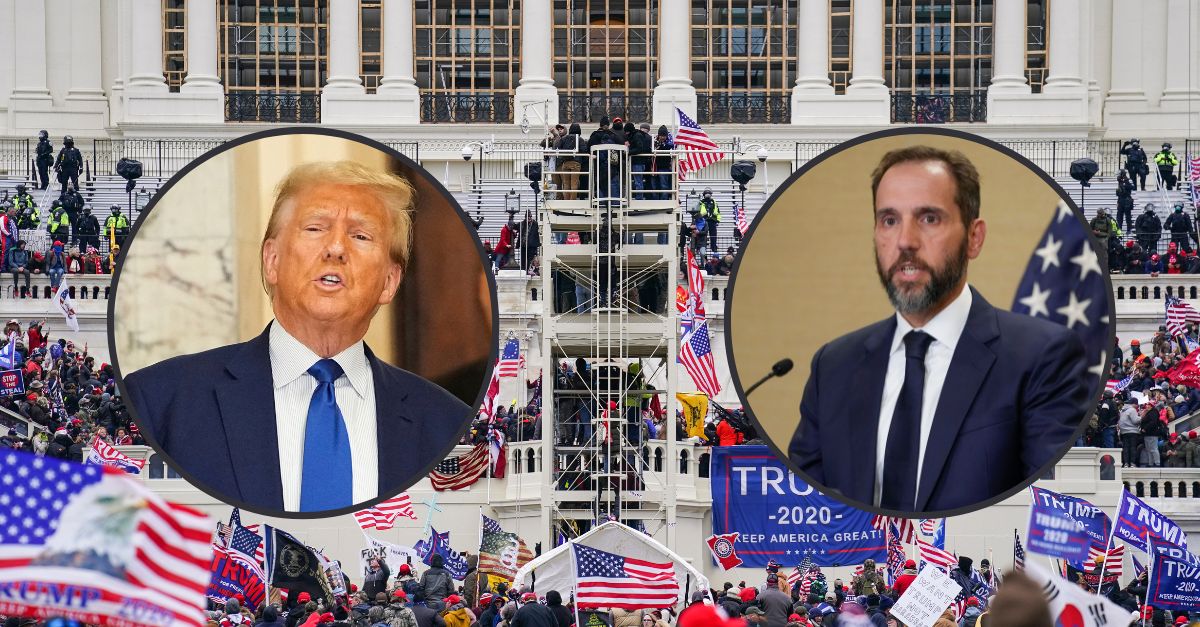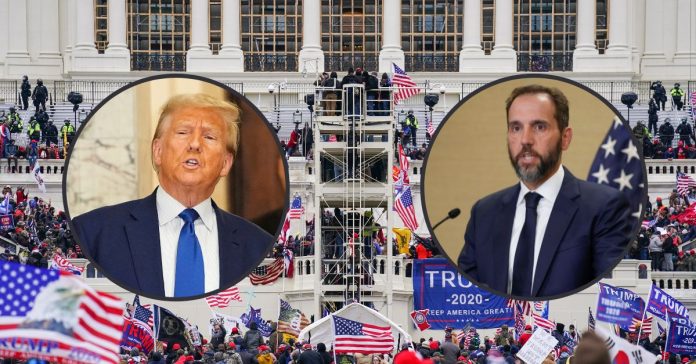
Background: Insurrectionists loyal to President Donald Trump breach the Capitol in Washington, Jan. 6, 2021. (AP Photo/John Minchillo, File)/ Left: Siegfried Nacion/STAR MAX/IPx 2023 10/25/23 Donald Trump at court in the New York State civil fraud case against the former president on October 25, 2023 in New York City. Right: Special counsel Jack Smith speaks about an indictment of former President Donald Trump, Aug. 1, 2023, at a Department of Justice office in Washington. (AP Photo/Jacquelyn Martin)
As pressures and penalties mount for former President Donald Trump at his criminal and civil trials in Georgia and New York, his lawyers in Washington, D.C., are eagerly trying to advance claims of “presidential immunity” in order to dismiss charges alleging he conspired to overturn the results of the 2020 presidential election.
Over the last month there has been a small but mighty torrent of filings flowing between Trump and special counsel Jack Smith in which they have parried over issues of immunity for presidents both former and incumbent.
Where the government has charged Trump with multiple criminal conspiracies alleging he defrauded the United States and corruptly obstructed proceedings on Jan. 6, 2021, Trump has responded that the charges are unconstitutional. He has sought to dismiss them multiple times on grounds that he cannot be prosecuted for acts taken “within the outer perimeter” of duties sitting “at the heart of his official responsibilities as president.”
His belief that the 2020 election was “stolen” is justified under those criteria, according to his attorneys fighting off the indictment.
They further maintain that his pure intent while commander in chief should squash the case altogether or, as they suggested in their latest motion filed Thursday, this could be something decided not by U.S. District Judge Tanya Chutkan, but by the U.S. Supreme Court.
“Although not yet resolved by the Supreme Court or any Circuit — because all prosecutors until now have respected Presidential immunity — the legal underpinnings and need for such protections are manifest,” Trump’s attorneys John Lauro, Todd Blanche and Gregory Singer wrote Thursday.
This echoed a line from a similar motion filed earlier this month where Lauro seemed to hanker for intervention from the Supreme Court, writing that, “no court has addressed whether such presidential immunity includes immunity from criminal prosecution for the president’s official act.”
Prosecutors seeking to keep the case in Washington, D.C., on track while also rejecting Trump’s invocation of “absolute presidential immunity” cited the very Supreme Court justice Trump appointed while in office, Brett Kavanaugh. In 2020, prosecutors wrote last week, Justice Kavanaugh wrote in his concurrence in Trump v. Vance that no one is above the law and that this concept “applies, of course, to a president.”
The special counsel tried to end-run Trump’s claims of immunity for former presidents too, seeking agreement from Chutkan that there are no “duties” nor zero “leadership role” a former president could have interfered with that could or should prohibit criminal charges from being brought if appropriate.
But Trump’s attorneys insist that “regardless of the Constitution” and the prosecution’s concepts around those tasked to uphold it, the “prosecution is wrong” on matters of immunity because presidents should have “the ability to make decisive — and often unpopular — decisions regarding matters of public concern,” Lauro wrote.
Presidents, to put the defense’s argument succinctly, should be left unencumbered from civil or criminal liability.
Noting there is not a provision in the Constitution that expressly grants presidential immunity, Lauro doubled down on the language of the Constitution’s impeachment clause.
When the U.S. Senate failed to convict Trump in 2021 for inciting an insurrection, Lauro argued, the ship to charge him lawfully with any crimes associated with that day — or any other, for that matter — after he left office had officially sailed. And that’s if the ship was ever in port to begin with, Lauro said.
“The Impeachment Judgment Clause states that, after a trial in the Senate, ‘the Party convicted shall nevertheless be liable and subject to Indictment, Trial, Judgment and Punishment, according to Law.’ U.S. CONST. art. I, § 3, cl. 7 (emphasis added). The Clause authorizes the prosecution of a President for conduct committed while in office, provided that the President is first ‘convicted’ of such conduct by the United States Senate,” Lauro wrote.
Recognizing presidential immunity as he deems it would not put Trump above the law, the defense has argued, but no amount of the government’s “lurid hypotheticals” around a president potentially being wrongly shielded from prosecution should factor into Chutkan’s decision.
Civil and criminal immunity for Trump upholds the “careful safeguards the framers erected around the Presidency for the sake of the public good and ensures that only Congress, as the People’s representatives, may decide when and whether” the president can be charged, Trump’s lawyers argued.
Trump highlights a wide variety of American presidents from days gone by that he says support his theory that he should not be charged for crimes if they were not either.
President George W. Bush, for example, was “accused of lying to Congress to induce the Iraq War on false allegedly pretenses by claiming that Saddam Hussein’s regime in Iraq was hoarding stockpiles of ‘weapons of mass destruction,’ which turned out to be non-existent,” Lauro wrote.
Former President Barack Obama was not charged, he wrote, for “authorizing the extrajudicial killing of a U.S. citizen located abroad through a CIA ‘kill list’ and a drone strike that killed both the citizen and his 16-year-old son, also a U.S. citizen.”
And while the government “relies on President [Gerald] Ford’s pardon of President [Richard] Nixon, arguing that it presupposes that Nixon could have been prosecuted for acts he committed as president, not so,” Trump’s lawyers wrote.
“The fact that Nixon was never prosecuted — despite widespread public outrage and compelling evidence of wrongdoing — provides compelling evidence of the strength of the historical tradition against prosecuting former Presidents for their official acts, not its weakness,” the motion states.
Suggestions by the government that Trump’s actions were illegal or fell outside the scope of his official duties as president made by special counsel fail because prosecutors are “incapable of articulating [an] argument [around immunity] without referring to Trump’s alleged motives.”
The question of Trump’s personal alleged motives are “irrelevant” Lauro argued.
Chutkan is expected to issue a decision soon on a variety of motions separate of the immunity issue. Special counsel has asked her this week to reimpose a gag order on Trump due to his “continued targeting of witnesses.”
Have a tip we should know? [email protected]

